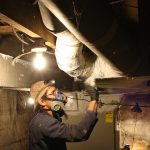Posts Tagged ‘Energy Savings for Appalachia’
Saving Energy, One Utility at a Time
Our Energy Savings for Appalachia team has been campaigning to bring energy efficiency to the High Country of North Carolina, a region that spends nearly three times more of their income on electric bills than the average American. The campaign’s current focus is encouraging Blue Ridge Electric Membership Cooperative to offer an on-bill financing program…
Read MoreThe economic impact of energy efficiency

In praise of the High Country Energy Contest’s community and business partners
The Energy Savings for Appalachia team would like to thank our community and business partners for making the High Country Home Energy Contest possible. Without their dedication and service, we would not have been able to offer three households the extensive energy efficiency home improvements that we have in the past month.
Energy Savings Advances in Tennessee and North Carolina
This September in Tennessee, Appalachian Voices participated in an energy efficiency “retreat” that brought the Tennessee Electric Cooperative Association and six of its member cooperatives together with a number of state agencies and numerous experts in energy efficiency finance.
Read More